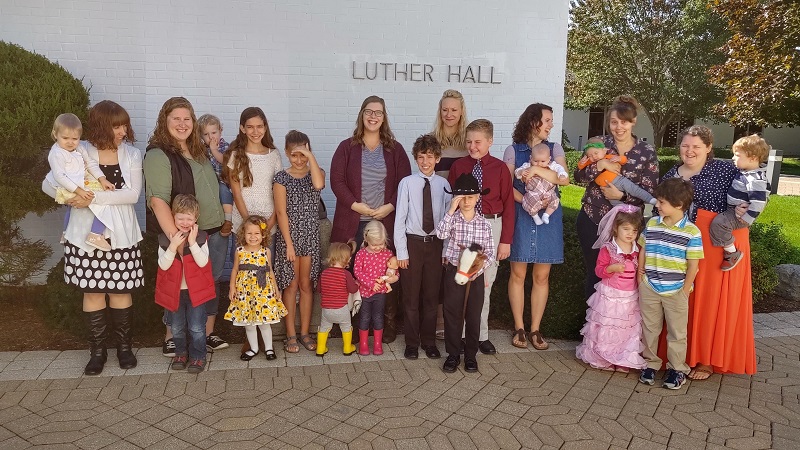Today was Donation Day, which is a tradition nearly as old as the Seminary itself. Donation Day started as a way to feed the student while they were studying for full-time church work. The CTSFW Seminary Guild cares for our students through Donation Day, taking on additional student projects through donations and their membership dues, as well as using their baking and crafting skills throughout the year for birthdays, snacks during final weeks, and gifts for newly born babies.
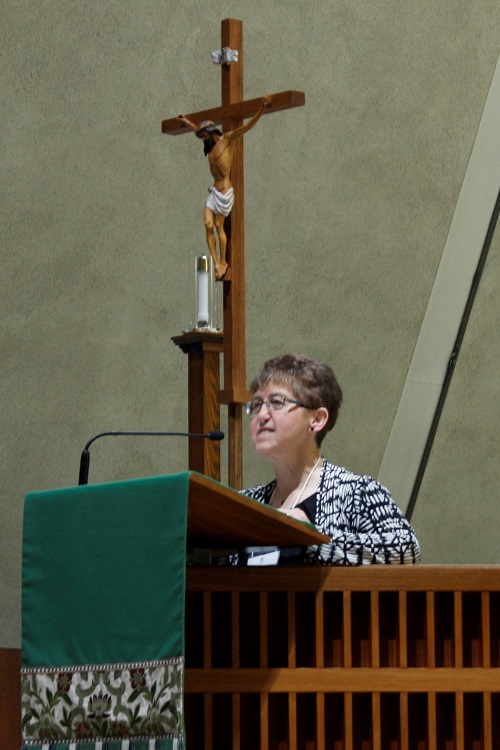 Phyllis Thieme, the President of the Guild, opened donation day immediately after chapel with a welcome to the visitors. Eighty-one years ago, in 1938 (the year before the Guild came into being), 1,0008 registrants arrived at the Springfield Campus for Donation Day. “Since the founding of CTS in 1846, the ladies of the Lutheran Church—Missouri Synod have always supported CTS, the students, and their families,” Mrs. Thieme said. “Let’s fast forward now to today. We may not have 1,008 registrants bringing their donations as they did back in 1938; however, the donations by the Lutheran Women Missionary League represent thousands of women who have given their donation, their support of the students here at CTS. A lot has changed since 1939, but one thing has not: the faithful giving of the many Lutheran Church—Missouri Synod women to help our future pastors and deaconesses and their families.”
Phyllis Thieme, the President of the Guild, opened donation day immediately after chapel with a welcome to the visitors. Eighty-one years ago, in 1938 (the year before the Guild came into being), 1,0008 registrants arrived at the Springfield Campus for Donation Day. “Since the founding of CTS in 1846, the ladies of the Lutheran Church—Missouri Synod have always supported CTS, the students, and their families,” Mrs. Thieme said. “Let’s fast forward now to today. We may not have 1,008 registrants bringing their donations as they did back in 1938; however, the donations by the Lutheran Women Missionary League represent thousands of women who have given their donation, their support of the students here at CTS. A lot has changed since 1939, but one thing has not: the faithful giving of the many Lutheran Church—Missouri Synod women to help our future pastors and deaconesses and their families.”

Jonah Domenichelli, 4th-year and president of the Student Government Association, introduced the five LWML District Presidents who were able to make it to Donation Day. He and his wife moved to Fort Wayne with three children and now have five; they know the tension between family needs and the rigors of education very well. “Moving here, like most students and families experience, can be very stressful because you’re trying to figure out where the money’s coming from; how are you going to pay for school? How are you going to take care of your family? How are you going to take care of yourself if you’re a student by yourself?” he said. “However, we were reassured that the Lord would provide for us when we moved here. And indeed he has. We have been supported through countless student adoptions and donors like yourselves, and God is faithful. And we appreciate everything He has provided through you.”
The five LWML District Presidents in attendance were Susan Gruber (Michigan District); Barbara Kaun (Wisconsin South District); Janice Gerzevske (Northern Illinois District); Jeanne Schimmelmann (Ohio District); and Marge Gruber (Indiana District). All five brought greetings from their districts and asked that the students from their districts stand, that they might recognize them. After chapel they met with these seminarians and deaconess students in the student commons for coffee, and later each gave a short report during the afternoon meeting on their work with the Food & Clothing Co-op (generally large grants to help fund the Co-op as well as student aid and scholarships).
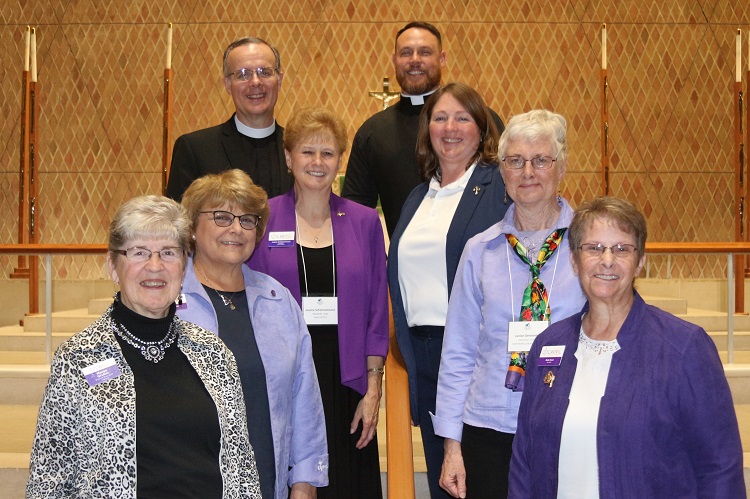
“This morning is the very best way to start the day,” Mrs. Schimmelmann said in her greetings to the Seminary, “worshiping our Lord in this beautiful chapel with our brothers and sisters in Christ. As it has been said, ‘It doesn’t get better than this.’”
Deaconess Katherine Rittner, Director of the Food & Clothing Co-op, began her speech with another historical comparison between now and then. In 1949, ten years after the Seminary Guild started, donation day visitors donated 221 dozen eggs, 97 chickens, 5,000 quarts of home-canned goods, and $1,500 in cash donations. “But what a difference 70 years makes!” she exclaimed, before reading another set of numbers. Last year, through the support of donors, the Food Co-op provided over 2,000 dozen eggs, 4,000 pounds of Brakebush Chicken (not to mention over 2,500 pounds of cow plus 12,000 pounds of pork), over 36,000 pounds of produce, and $12,225.06 was spent at local grocery stores. “In this ever-changing world, the focus of the Guild remains the same: to care for their students and families,” she said. “As mentioned, the LWML is a large supporter of us; we can’t do this without you.”
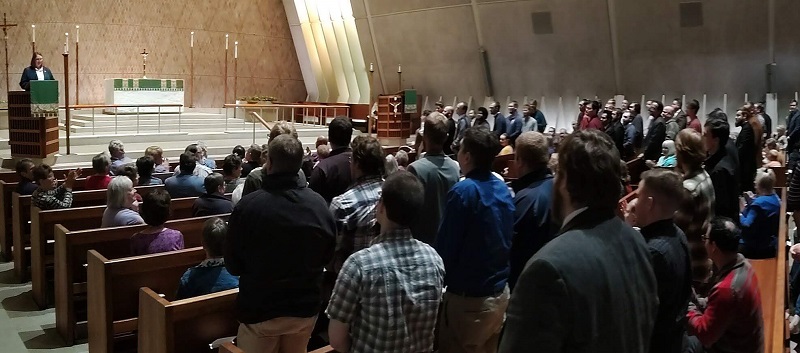
She then had all the students stand, starting with those who hadn’t stood yet and finally asking that all students rise to their feet. “This,” she said of the standing students, “this is who you are caring for. From the students, from the faculty, from the staff—as a former student, former student wife, current staff member—from the bottom of my heart I thank you for what it is that you do for our students and their families. Thank you.”
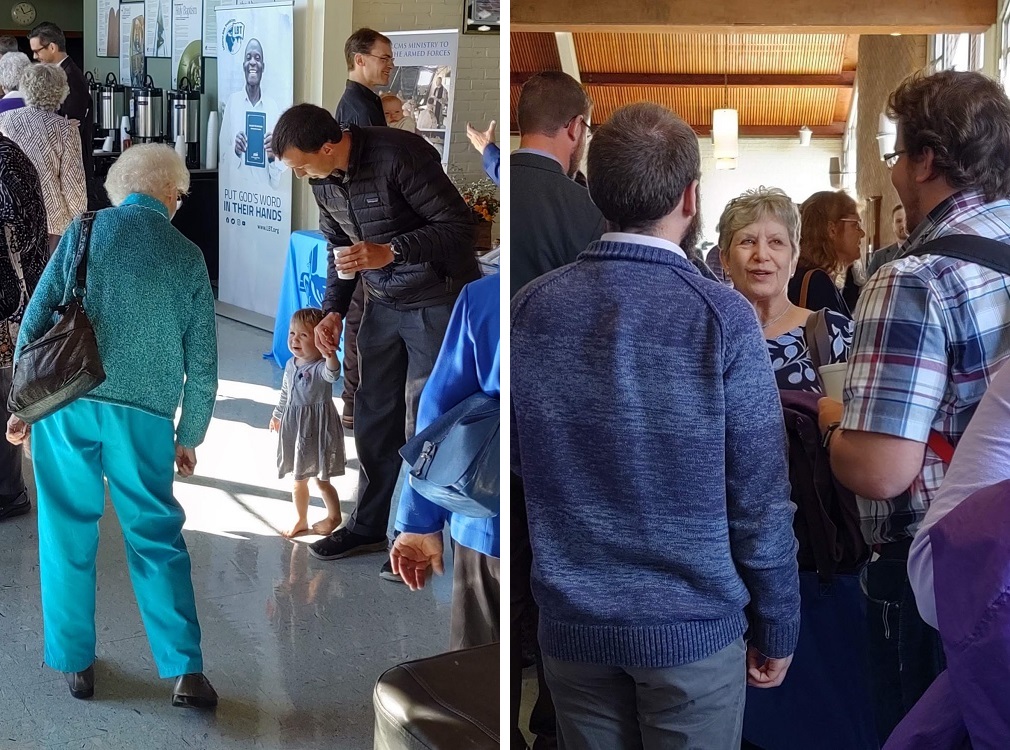
During lunch, as a treat for the ladies Deaconess Rittner had student wives (and at least one student wife who is also a seminary student herself, studying to become a deaconess) and their children held a fashion show. They wore clothes they found at the Co-op. Most of the little girls—when they weren’t feeling shy—were thrilled; the boys less so. You can view photos from the show in the pictures provided here.
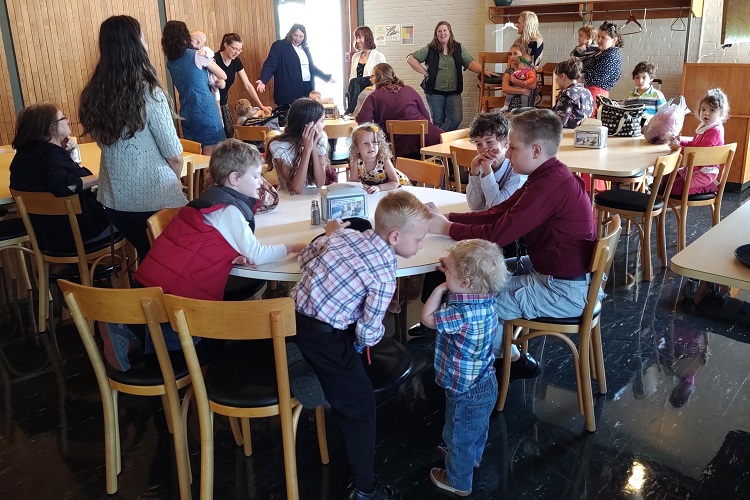
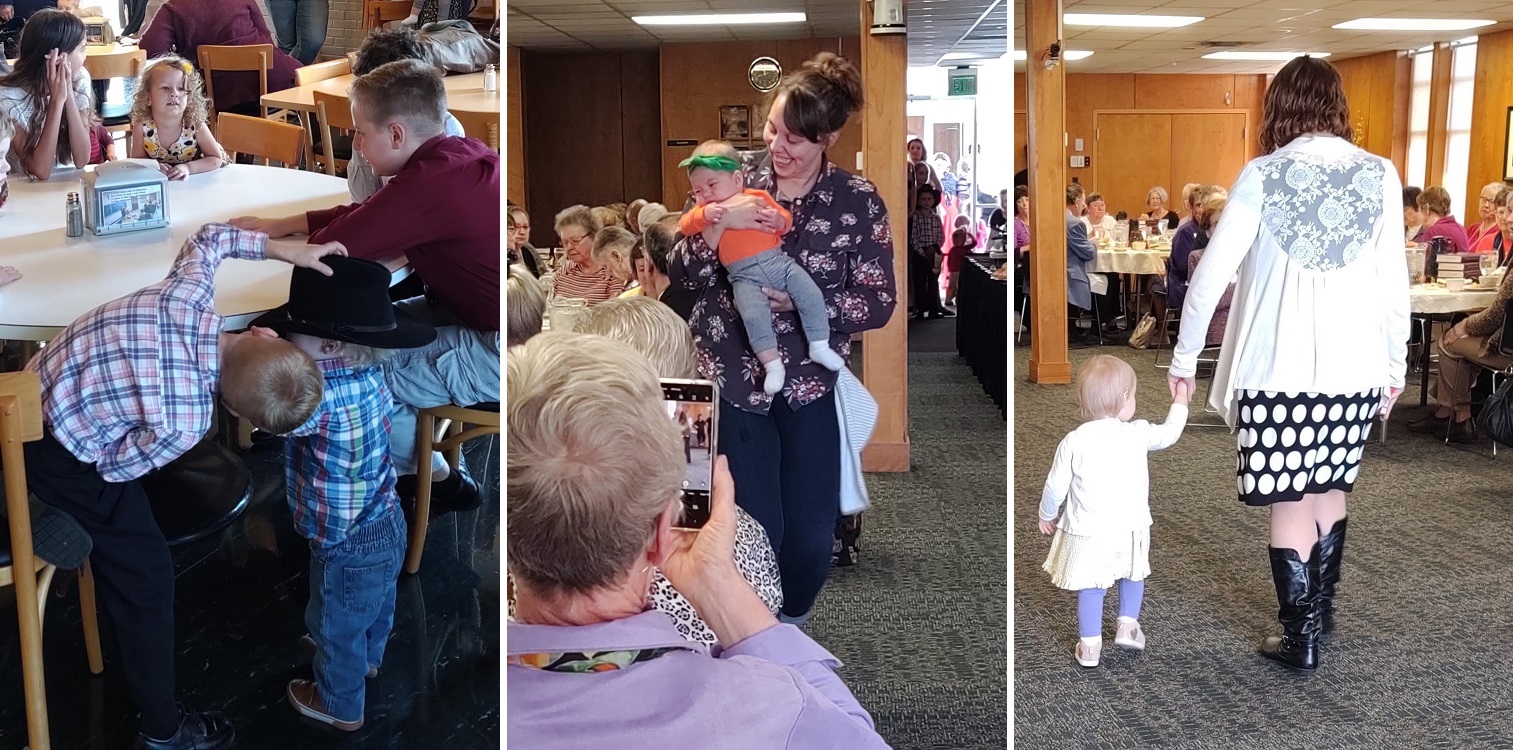
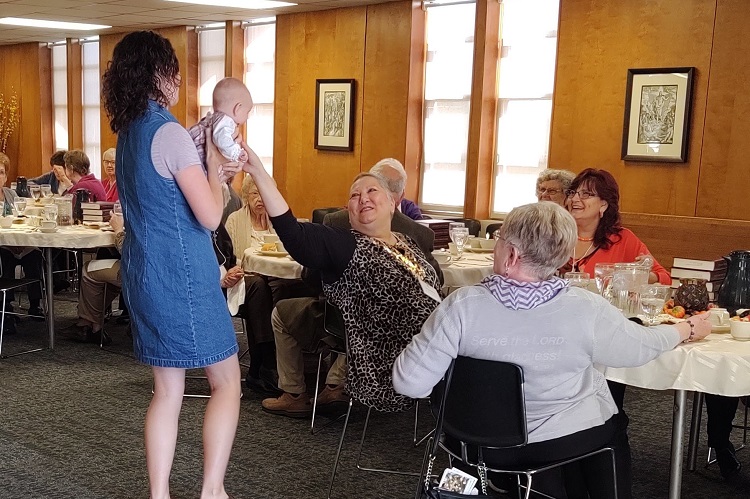
Lance Hoffman, Advancement Officer since 2016 and newly appointed Assistant Vice President of Operations, also spoke at the afternoon meeting. He taught at Concordia Lutheran High School in Fort Wayne for 26 years before joining CTSFW. The high school is his alma mater; when he graduated from college with a teaching degree and was called back to his old school, his father was a colleague and his little brother was one of his students.
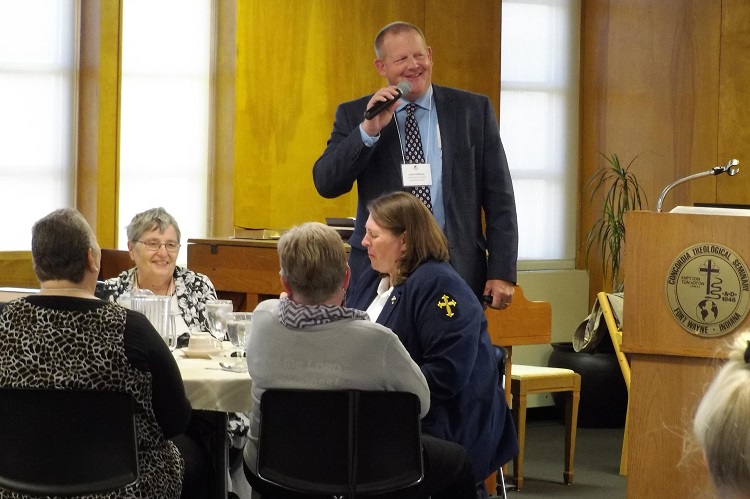
As a former history teacher and now an advancement officer serving the financial needs of CTSFW, Mr. Hoffman’s presentation married both: to effectively raise money for CTSFW, the Advancement Department has to understand both where society came from and where it’s going. “Changes in our society require changes in our strategy,” he explained.
He largely bypassed the first 100 years of CTSFW’s history (“Things are so different before that it’s almost useless to consider strategies,” he explained), and focused on the past 80 years. The post-war era from 1945-1975 was the golden age of the middle class in America. Television began replacing radio and print and everyone answered their phone and read their mail. “We’ll get to today when virtually none of this is true,” Mr. Hoffman said briefly, before returning to the post-war period. Planes and cars had replaced trains as interstate highways and airports sprung up everywhere. Synodical support was high.
Because of this, the Seminary operated on a “big net, small fish” strategy; what we would now call the Annual Fund approach. With a robust middle class (and in conjunction with modest educational costs), it worked well. With many small gifts meeting their needs, little attention was given to major gift cultivation or long term planning. “But if there’s one thing you can be sure of,” Mr. Hoffman said, “is things will always change.
“Both seminaries were blindsided by undergraduate debt. No one predicted that we would have pastoral and diaconal students coming in with $100,000 in debt,” he explained. In the 1960s a part-time job could pay for most education costs. In the 70s, the wealth gap between rich and middle class began to expand while educational costs rose almost incomprehensibly fast. “Minimum wage has not gone up 2,000% like education costs,” he said. “Times have changed and the math doesn’t add up anymore.”
“Big net, small fish” no longer works on its own. The top 10% of the nation holds 67% of the wealth and the bottom 90% the remaining 33%. Nor have communication changes been conducive to philanthropy efforts. Land lines and snail mail are fading. There are a dozen new ways to contact people (email, cell phones, social media) but in a sea of noise, that’s made it harder to be heard. There have been no major changes in transportation from 1976-2019, save for access: with private planes and 24/7 travel, people now live seasonally and the wealthy own multiple homes. National trends have affected the LCMS at all levels, especially in the difficult years in the 80s and 90s. Synod still supports her seminaries, but not in the same way financially. Both seminaries have had to become financially independent.
Many middle class donors still continue to give to their seminaries. They provide millions a year—but today that’s millions short. We have thousands of donors who give generously of their means, but we’d need thousands more to make up the difference.
This is where major gift cultivation—particularly through endowments—come into play. An endowment is a gift that can never be spent. Rather, the gift is invested and CTSFW spends a percentage of the earnings. The great advantage is that these gifts last as long as the Seminary does. Since the post-war era, CTSFW has gone from 0 in endowments to millions. “Not bad for a school our size,” Mr. Hoffman said. But: “Bad for a school our age.” Harvard, for example, has endowments in the billions. The difference is that Harvard, established in 1656, has been cultivating major gifts for hundreds of years. CTSFW didn’t start until 100 years into her history.
Chairs are another type of endowment, set up to pay for a specific professorship, as the earnings from the investment pay for that position’s salary and benefits no matter who holds it. CTSFW has five at this point, all still currently held by their original faculty recipients: Dr. James Bushur in The Carl and Erna Weinrich Associate Professor of New Testament and Early Church Studies chair; Dr. Cameron MacKenzie in The Forrest E. and Frances H. Ellis Professor of German Reformation Studies chair; Prof. Robert Roethemeyer in The Wakefield-Kroemer Director of Library and Information Services chair; Dr. David Scaer in The David P. Scaer Professor of Biblical and Systematic Theology chair; and Dr. Roland Ziegler in The Robert D. Preus Associate Professor of Systematic Theology and Confessional Lutheran Studies chair. These will be passed on as these men retire and new faculty take their place.
The Advancement strategy, according to Mr. Hoffman, is clear: “Blending the tried and true with the new.” We need both those who give major gifts and those who give according to their more modest means. And that doesn’t yet take into account the generosity that comes to our students in the form of home congregation gifts, student adoptions, and the Co-ops. There’s also the additional projects, like the recent renovations to W8 and L7 (the campus was only 20 years old when CTS first moved onto the grounds but now the infrastructure is 65 years old and starting to show it), the capital campaign for the library expansion project, and, in 2018, the introduction of the 100% tuition grant for full-time residential pastoral and diaconal students.
“You’ll note,” Mr. Hoffman said. “I didn’t say ‘free.’” A seminarian may no longer be responsible for his tuition (though he’s certainly expected—and is required to promise—that he will help by applying for scholarships and aid), but someone’s certainly paying for it: the Body of Christ. The Church cares for her future pastors and deaconesses.
This is important, not only because it meets the modern challenge of the educational debt crisis, but because we need church workers. Enrollment is down at both seminaries, as is church worker enrollment in the Concordia University System. Take into account that 50% of pastors in the LCMS are over the age of 55, and in the next 10 years we’ll lose 3,000 pastors to retirement. (Though perhaps slightly later, Mr. Hoffman conceded: “Pastors are a weird breed,” he said to laughter, “They don’t often retire at normal retirement age.”). Our two seminaries are currently producing only about 100 new pastors a year; or, 1,000 new pastors over the 10 years.
Mr. Hoffman’s solution: “Give us the students. We’ll figure out the money.”
And we remember this too: the need is urgent, but not desperate. With the Lord of all—Father, Son, and Holy Spirit—on our side, we can never be desperate. But we can ask ourselves what we can do where He has placed us. Some of us give financially, some of us choose to go into church work, still others serve as the voice that asks her grandson, or his neighbor, or our friend if he has ever thought of becoming a pastor.
“The seed sprouts and grows; he knows not how,” (Mark 4:27). The Lord of the harvest grows His kingdom and commands that we pray to Him for laborers. May we do so cheerfully and boldly, knowing we can trust His promises.
